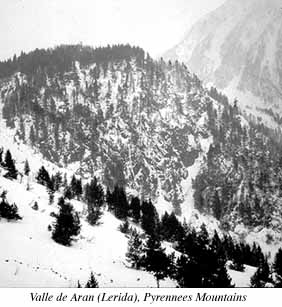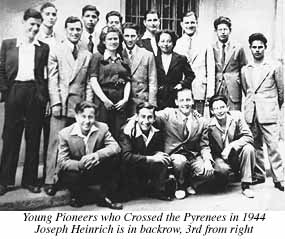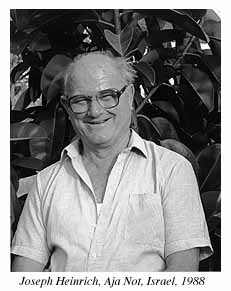Joseph Heinrich Tells His Story (conclusion)
To Spain: Joop Westerweel and his group arranged for us to cross over the Pyrenees into Spain in February '44. He made connections with a Jewish group in the French Maquis, and they had connections with smugglers who knew the mountains. Joop's Dutch organization paid the smugglers so much for every head. As in all the underground groups, you only knew what you needed to. They told you on a certain day, at a certain hour, you have to be here. You didn't ask questions. So many things we only learned about afterward. Joop came all the way to the Pyrenees
to say goodby
to us. On the way back he was caught, because of a false name; he had the papers of a man the Germans were looking for. It was very stupid. Why did they catch him and not me?
We crossed at the highest point in the Pyrenees--about 3,000 meters--near a point called Pic de Montvalie. The smuggler guides brought us half-way, pointed out the direction to Spain, and left us there. Then the thirty-four men in our group had to climb the mountain.
 The snow was so high, when my little brother took a step he sank up to his chest--he almost disappeared. Another group crossed over the next summer, and found the track we had made in February; the snow was so deep it was still there five months later.
The snow was so high, when my little brother took a step he sank up to his chest--he almost disappeared. Another group crossed over the next summer, and found the track we had made in February; the snow was so deep it was still there five months later.
We had a French police officer with us, a non-Jew who was in trouble and had to run away, I don't know why. Nobody asked anybody anything. If you were part of the group, fine; we all went together. Fortunately, this man was experienced in the mountains. During the day the marching kept us from freezing, but when night came, we were on top of the mountain: it was snowing and very cold. He showed us how to bury ourselves in the snow to stay warm through the night. Some people didn't trust him at first because he was a policeman, but we were lucky to have him: we were wearing only light clothes, and might have frozen to death otherwise. We didn't have much food: each man had eight or ten cubes of sugar and a little bit of raw meat. For water we had snow. When we were hungry we put a little bit of meat in our mouth and chewed on it.
We marched for three days, but--it's amazing--I didn't feel real hunger.
I knew I was climbing the mountain; I saw the clouds, and they were beneath me! There was ice and snow, snow and ice everywhere; the sun was shining. How did I feel? I don't know!
It was a very hard thing to do, but once we started there was no other choice. We were thirty-four men, and we all made it. There was one old man with us--he was about sixty--and the rest were all boys of nineteen or twenty. Before we began the march they told us, "Don't expect help along the way. If you fall down, you cannot expect help." At a certain moment the older man and a young Dutchman, who was very heavy, fell behind. We had stopped for a rest, sitting down for half an hour or so, when far, far behind us we saw these two men crawling on all fours. We talked it over and said, no, we won't let them die in the mountains. We sent a few of the strongest back to get them. After that, we pulled and pushed them all the way for two more days, and they made it.
 In the evening of the third day we came to Mohgarri, on the Spanish side of the border. We spent the night with a man who was very kind: he cooked soup for us; we gave him watches and fountain pens. People in the village asked where we were coming from. When we told them Pic de Montvalie, they said, "No, that's impossible! No one could come from there in February." But we did.
In the evening of the third day we came to Mohgarri, on the Spanish side of the border. We spent the night with a man who was very kind: he cooked soup for us; we gave him watches and fountain pens. People in the village asked where we were coming from. When we told them Pic de Montvalie, they said, "No, that's impossible! No one could come from there in February." But we did.
The next day, two boys whose feet were bad stayed behind, while the rest of us went on to Esterri. As we left, we saw fresh ski tracks pointing away from the village; we knew that someone went off to warn the Spanish police about us.
By then we were so exhausted we didn't even care; whatever would happen would happen.
We walked all day--ten hours--until we came to Esterri. The police were waiting for us. They locked us up for the night. The next day four or five policemen were asking our names--things like that--but only one of them could even write. Well, he didn't so much write as paint the letters.
 Of course we had thrown away our papers before we crossed the border. Later they gave us a meal at a little restaurant. There was not much food available, but the wine was plentiful.
Of course we had thrown away our papers before we crossed the border. Later they gave us a meal at a little restaurant. There was not much food available, but the wine was plentiful.
To Palestine: At that time the Spanish government was accepting refugees from Nazi-occupied countries who made their way into Spain. My group went first to Lerida, then to Barcelona where we hoped to sail immediately. But we had just missed the Portuguese ship, Nyassa, which departed at the end of January, carrying seven hundred and fifty immigrants to Palestine. We waited eight months for the next opportunity. From time to time small groups of French and Dutch Young Pioneers who crossed the Pyrenees in subsequent treks, joined us. We were supported with funds provided by the American Joint Distribution Committee and The Jewish Agency. Finally, in October 1944, the S.S. Guine sailed from Cadiz for Palestine carrying one hundred seventy-five young Jewish refugees who had illegally crossed the Pyrenees. I was among them.
We landed in Haifa on November 4, 1944. I have been here since that time and there has always been war, more or less. C'est la vie.
Joseph Heinrich gave this interview in his home in Aja Not, Israel, April 10, 1988. He passed away on November 17, 1992 at the age of sixty-eight. He is survived by his wife, Rachel Heinrich.
 The snow was so high, when my little brother took a step he sank up to his chest--he almost disappeared. Another group crossed over the next summer, and found the track we had made in February; the snow was so deep it was still there five months later.
The snow was so high, when my little brother took a step he sank up to his chest--he almost disappeared. Another group crossed over the next summer, and found the track we had made in February; the snow was so deep it was still there five months later.
 In the evening of the third day we came to Mohgarri, on the Spanish side of the border. We spent the night with a man who was very kind: he cooked soup for us; we gave him watches and fountain pens. People in the village asked where we were coming from. When we told them Pic de Montvalie, they said, "No, that's impossible! No one could come from there in February." But we did.
In the evening of the third day we came to Mohgarri, on the Spanish side of the border. We spent the night with a man who was very kind: he cooked soup for us; we gave him watches and fountain pens. People in the village asked where we were coming from. When we told them Pic de Montvalie, they said, "No, that's impossible! No one could come from there in February." But we did.
 Of course we had thrown away our papers before we crossed the border. Later they gave us a meal at a little restaurant. There was not much food available, but the wine was plentiful.
Of course we had thrown away our papers before we crossed the border. Later they gave us a meal at a little restaurant. There was not much food available, but the wine was plentiful.